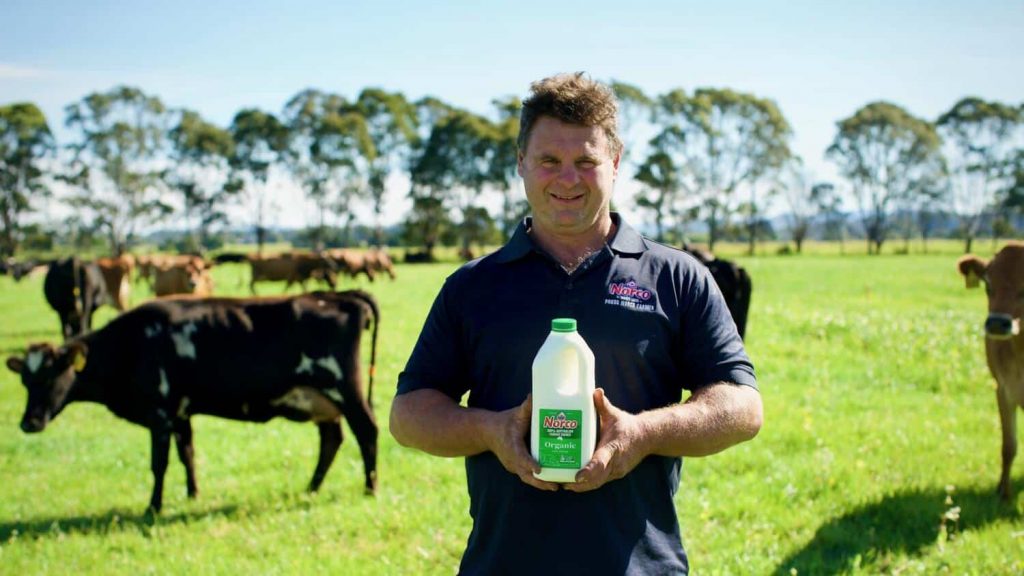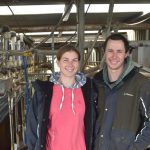
Dairy farmers Chris and Ann Eggert have a 200-hectare organic farm at Wauchope, on the NSW Mid North Coast.
They belong to Australia’s largest and oldest dairy co-operative, Norco, and proudly serve as Norco’s biggest organic milk supplier.
Chris is a fourth-generation farmer, continuing the traditions of his great-grandfather.
Chris and Ann, both 49, met at the University of New England in Armidale in 1995 and Ann joined Chris on the family farm 24 years ago when they got married.
Chris’s parents continue to help on the farm with general farm work and assist in milking their 200 cows.
Chris and Ann have three boys — Lachie, 20, Jimmy, 18, and Billy, 13. This year their 18-year-old joined the farm as a fifth-generation dairy farmer.
The youngest, Billy, is also heavily involved in the farm life collecting the eggs, milking the cows, feeding the calves, shifting fences, watering the animals, driving the tractor and any other general farm work.
Although Chris and Ann have been dairy farmers for 24 years, they decided to try their hand at organic farming 12 years ago — first with pigs, then with farming organic eggs.
From 2013 they started managing the whole egg operation themselves and for the past three years have been supplying organic meat to retail.
This includes making all their own compost from cow manure which they mix with hay or sawdust to use as fertiliser. They are also strong advocates for recycling to improve the farm and environment.
Chris said there was a societal perception that cows are bad for the environment. However, cows actually put carbon in the soil, which improves the environment in the long run.
“Healthy soil means healthy plants and animals, which results in healthier products and milk for consumers,” he said.
Chris and Ann have established a grazing rotation and through diversifying their pastures they see healthy soil with a lot of worms. It also prepares the land to be resilient to floods and droughts.
For 22 years the Eggerts have been on a path of education and sustainability and a decade ago they started doing the Hastings Farm Gate tour where they open their farm up to schools and the community.
Chris said during COVID-19 the school tours had to cease, but they are now full steam ahead with an average of one farm tour booked per month with anywhere from 40 to 100 students in attendance.
“Many of the children on our tours have never had the chance to visit a farm before. We provide them the opportunity to experience something entirely new and different.
“When we have a tour booked, we keep 10 cows aside for children to experience milking and they are surprised to learn milk comes from a cow and not a bottle at the supermarket.
“After milking we take them over to the chickens and they get the opportunity to collect fresh eggs.
“I also dig into the soil and talk about where the nutrients come from and how important it is to look after the environment for our cows to produce milk with high quality fat and protein content.
Ann said the opportunity to take part in the Hastings Farm Gate was to celebrate quality locally grown produce across the greater Hastings, Port Macquarie and Camden Haven region.
“Many people these days have no idea where the food they purchase at the grocery store comes from,” she said.
“We love the opportunity to open to the public for tours, field days and various events aimed at educating more Australians.
“Not only on the benefits of organic farming and how sustainability can heal the earth, but also so they appreciate our vital agricultural industry and have an understanding on where their food comes from.”
Ann said the people who attend the tours really enjoy being showed what they do on the farm and how the food they eat is produced.
“The children are highly engaged to learn about all the product we produce on our farm.
“They love the opportunity to milk the cows, collect the eggs and try some of our delights from the vegetable gardens.
“As a result of attending our farm tours, they realise that organic farming is really beneficial to the landscape and can be really productive without the use of anything artificial or synthetic.
“Not only do they have the opportunity for hands on learning during the tours they also have a greater appreciation for the hard work and dedication involved in farming.”



















